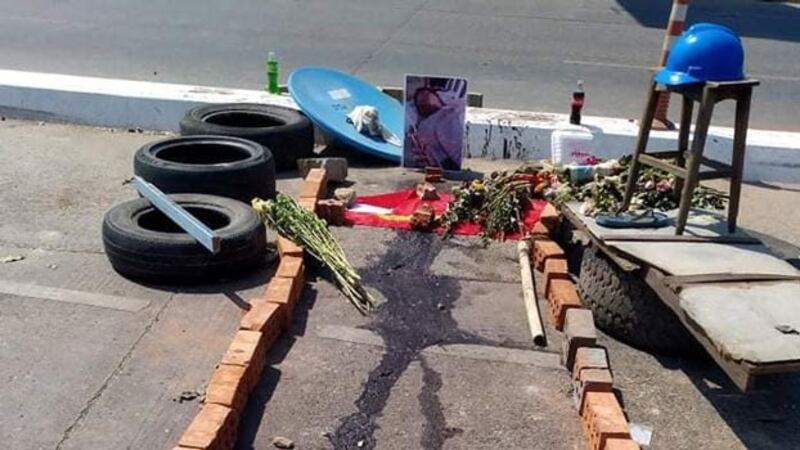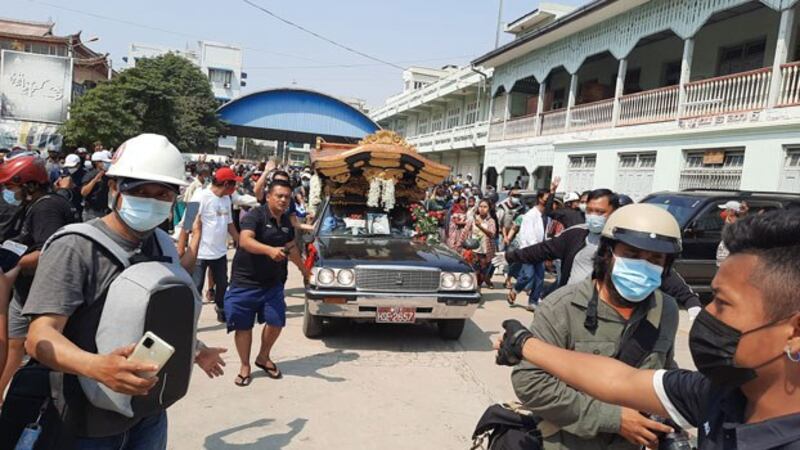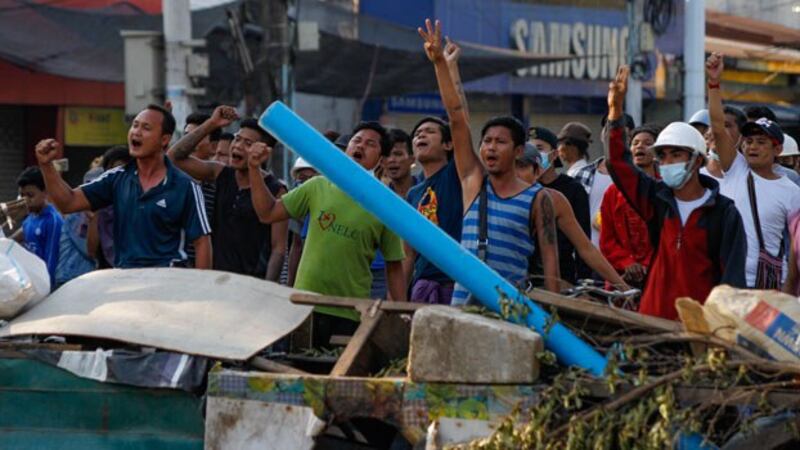UPDATED at 6:48 P.M. ET on 2021-03-04
The U.N.'s rights office and humanitarian organizations on Thursday condemned violent crackdowns on anti-junta protesters and the rising death toll in Myanmar amid peaceful countrywide demonstrations following the deadliest day in more than a month since the military coup seized power from the democratically elected government.
The U.N.’s rights office (OHCHR) said Thursday that it had verified 54 deaths since the coup began on Feb. 1, though the actual figure could be higher.
“It is utterly abhorrent that security forces are firing live ammunition against peaceful protesters across the country,” Michelle Bachelet, U.N. High commissioner for human rights said in a statement on Thursday.
More than 1,700 people, including lawmakers, activists, elections officials, rights defenders journalists, civil servants, teachers, and health care workers, have been arbitrarily arrested and detained over participation in protests or engagement in political activity since the coup began, with at least 700 detained on Wednesday alone, said the U.N. human rights office.
At least 38 people were killed on Wednesday — the bloodiest day of the protests — and more than 100 were injured at rallies throughout Myanmar, said Christine Schraner Burgener, the U.N. secretary-general’s special envoy for Myanmar, at a briefing the same day.
Myanmar police appeared to be using 9mm submachine guns along with live ammunition against demonstrators, she said.
An RFA tally of the deaths confirmed that 39 people had been killed.
In response to the escalating violence against peaceful protesters, the United States on Thursday implemented new export controls on Myanmar and added the ministries of Defense and Home Affairs, and the military-run Myanmar Economic Corporation and Myanmar Economic Holding Limited to its trade blacklist. The U.S. already has sanctions in place on the country's top military leaders.
Schraner Burgener said that in discussions with the army, she warned military regime leaders that U.N. member states and the Security Council might take “strong measures” against them, to which they replied, “We are used to sanctions, and we survived the sanctions time in the past.”
“I also warned they will go in an isolation,” she said at the briefing, to which they responded, “We have to learn to walk with only a few friends.”
The March 3 killings followed extreme violence on Feb. 28 when security forces killed at least 18 people, according to the U.N.
Much of the violence on Wednesday took place in Yangon region, where police were caught on CCTV using the butts of their rifles to beat four volunteer medics who were helping wounded protesters and shooting out the windows of their ambulance.
At least five children have been killed, at least four severely wounded, and over 500 arbitrarily detained by security forces since protests began last month, according to the U.N. Children's Fund (UNICEF).
“UNICEF condemns in the strongest possible terms the use of force against children, including the use of live ammunition, and the arbitrary detention of children, and calls on security forces to immediately refrain from violence and to keep children and young people out of harm’s way,” said a statement issued by the agency on Thursday.

ICRC calls for restraint
Security forces have ramped up the level of violence in recent days, firing live rounds at protesters, using stun grenades, spraying tear gas, damaging property and vehicles, forcibly entering and ransacking homes, and detaining people arbitrarily. They also are increasingly targeting heath care workers and volunteer medics assisting the injured.
The International Committee of the Red Cross (ICRC) said Thursday that it is closely monitoring developments in Myanmar and is seriously concerned about the growing number of violent deaths in recent days.
“At times when demonstrations remain frequent and widespread, and when numbers of people killed or seriously injured are rising, the ICRC is calling on all for restraint in Myanmar,” a statement issued by the humanitarian organization said.
International rights groups also criticized the growing violence against peaceful protesters.
“Myanmar’s security forces now seem intent on breaking the back of the anti-coup movement through wanton violence and sheer brutality,” said Richard Weir, crisis and conflict researcher at New York- based Human Rights Watch, in a statement n Thursday.
“The use of lethal force against protesters rescuing others demonstrates how little the security forces fear being held to account for their actions,” he said.

Protesters out in full force
Despite the heavy violence, anti-junta protesters were out in force again on Thursday in the cities of Yangon, Mandalay, Naypyidaw, Pathein, Kalay, Dawei, Mawlamyine, Hpa-an, Kyaikto, and Kawkareik. Violence was reported in Pathein, Ayeyarwady region, where shooting by security forces occurred. There were no reports of arrests and casualties, however.
In Yangon region, police and soldiers using smoke bombs carried out a morning raid on a protest camp on Kyundaw Road in Sanchaung township, forcing demonstrators to flee to safety without any confrontation.
In North Okkalapa township, where several people were killed on Wednesday, demonstrators resumed rallies, while the families of some of those killed Wednesday retrieved their relatives’ bodies from a hospital.
Thet Su, the wife of Po Chit, who died yesterday, told RFA that she last spoke to her husband around 4:30 p.m. the previous day and asked him to return home.
“I told him I heard about the shootings and that I was worried and frightened, but he said he was not coming home,” Thet Su said. He was later killed by security forces.
Tin Min Tun, a police major from Yangon region, who left his job and joined the civil disobedience movement (CDM) against the junta, condemned the violence and called on police in North Okkalapa township to join the campaign.
“Residents and young people of North Okkalapa are fighting peacefully for democracy, fighting for their future,” he said during a rally. “I want to warn you, North Okkalapa Police Force, if you do not join the CDM now, you will have to take the blame for the atrocities committed yesterday by the police and soldiers [brought in] from other areas.”
In Mandalay, Myanmar’s second-largest city, protesters continued their marches throughout the day as soldiers tried to intimidate them by sending fighter jets over the city’s airspace.
“The use of violence by the military is not acceptable either for our nation or for the world,” Tayza San, a doctor, told the crowd. “We will carry on with our anti-dictatorship movement no matter how much violence they use. We will resist them and fight for democracy.”
Tens of thousands of people attended a memorial service for Kyal Sin, a 19-year-old woman nicknamed Angel, at the Yunnan Buddhist Temple on 80th Street, a day after she was shot dead when police opened fire opened fire on a crowd of protesters.
Zin Myo Maung, an 18-year-old who was shot Wednesday in the town of Kalay, Sagaing region, died Thursday, the activist group Justice for Myanmar said.
The Assistance Association for Political Prisoners (AAPP), a watchdog group, said that as of Thursday, 1,507 people had been arrested, charged, or sentenced in relation to the military coup, with 1,200 still being held.

Policemen flee to India
While some police officers have followed Tin Min Tun’s example and left their jobs to join the CDM, others have left the country to seek refuge away from the military regime they are obligated to serve.
Police in northeast India said they have detained at least seven Myanmar policemen who entered the country seeking refuge from the military regime, the Associated Press reported Thursday.
Four officers arrived in Mizoram state's Champai area on Feb. 28, and local villagers handed them over to state authorities on March 1, while the other three crossed into Indian territory Wednesday near Lungkawlh village close to the border with Myanmar, Indian officials said. The village is 13 kilometers (8 miles) from the border with Myanmar.
The trio indicated that they escaped from the country because Myanmar soldiers were looking for them after they refused to obey orders, an Indian police officer told the AP.
India, which shares a 1,643-kilometer (1,021-mile) land border with Myanmar, is home to thousands of refugees from the Southeast Asian country.
Reported by Roseanne Gerin and RFA’s Myanmar Service. Translated by Khin Maung Nyane. Written in English by Roseanne Gerin.
